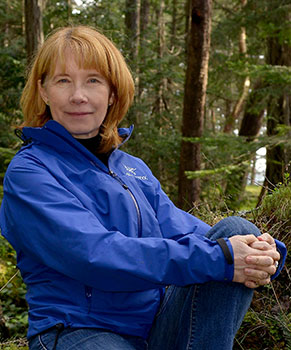 Linda Hannah devotes her time to “big, persistent problems.” Recently appointed U of G’s 2015 Kinross Chair in Environmental Governance, Hannah works to restore biodiversity, provide offsets to climate change and prevent habitat loss.
Linda Hannah devotes her time to “big, persistent problems.” Recently appointed U of G’s 2015 Kinross Chair in Environmental Governance, Hannah works to restore biodiversity, provide offsets to climate change and prevent habitat loss.
Hannah, who has a PhD in geography from the University of Victoria, is on leave from her position as regional vice-president at the Nature Conservancy of Canada (NCC), where she conserves and stewards ecologically significant land in British Columbia.
As Kinross Chair, Hannah will spend one semester at U of G working with the University and community partners to help develop innovative ways to address current and emerging environmental issues. Her post will run from September to December 2015.
Hannah has two other goals: to work as closely as possible with students and to showcase the work of the NGO community.
“The success of the Nature Conservancy of Canada is all about partnerships,” she says. “The tradition of governance is about steering and co-ordination; modern-day governance must be about partnerships and working together to address and resolve the most intractable problems of our time. No one person, no one agency, no one sector has the answers.”
Conservation of natural spaces is an important issue in Canada. While the Convention on Biological Diversity calls upon each nation to designate at least 17 per cent of its land for preservation, as of 2013 Canada had only 10.4 per cent of its land in conservation status.
“Conservation means to take care of and steward resources to preserve options for future generations,” she says. “There is a huge gap between where we are and where we want to be, and we know we have to do better.”
Hannah adds the world is standing on the edge of great change, with huge risks but also many opportunities to make things better.
“It is not just a biodiversity crisis we must address, it’s also climate change, water supply issues, transportation problems and economic livelihood,” she says. “It’s the whole social contract between humans and the environment.” It’s because of this broad sweep of issues that she sees partnerships and good governance as so essential.
Hannah would also like to see those working in this field broaden their perspective and change their approaches. Rather than seeing the various environmental goals as ceilings or the maximum achievable, she hopes more people see them as floors — a good place to start building. “When the land is strong, so are the people. Commitments to conservation and making sustainable choices benefit all of us.”
She doesn’t mean that only in a philosophical sense. “Good ecology is good economics and social prosperity.”
John Smithers, interim dean of the College of Social and Applied Social Sciences, says the Kinross Chair is designed to be a portal for knowledge and information exchange, so it is held by a succession of environmental leaders rather than one scholar. He says Hannah’s real-world knowledge will benefit students.
“Dr. Hannah’s presence on campus will add a vibrant dimension to undergraduate and graduate studies beyond what our students will find in their textbook,” says Smithers. “In particular, she will provide valuable insights on the growing importance of non-government organizations and partnerships in the practice of environmental governance in Canada.”